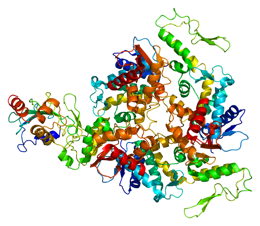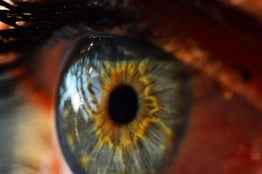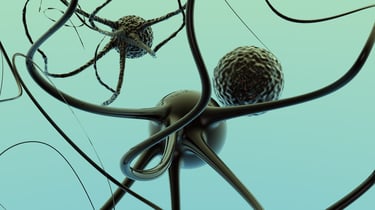UC Davis Medical Center researchers have recently been awarded several grants to investigate promising treatments for Angleman Syndrome. Dr. David Segal, professor in the Department of Biochemistry and Molecular Medicine, has received over $1.2 million from the Foundation for Angelman Syndrome Therapeutics (FAST) to develop a potential treatment. Joe Anderson, PhD, assistant adjunct professor in the Department of Internal Medicine, received $500,000 from the same organization to pursue a different approach to developing a treatment for the genetic disorder. The university also received a $1.1 million grant from the California Institute for Regenerative Medicine (CIRM) in July, which brings the total for Angelman Syndrome grant funding to nearly $3 million. This puts UC Davis at the forefront of research into the disorder.
 (Image of UBE3A Protien courtesy of Wikimedia Commons)
(Image of UBE3A Protien courtesy of Wikimedia Commons)
Read More
Tags:
Biotechnology vendor show,
Biotechnology Vendor Fair,
UC Davis - Medical Center,
research grants,
UC Davis,
Bioresearch Grant,
angelman syndrome
UC Davis Professor Kit Lam has been awarded two separate federal grants to further his cancer research. The first grant is from the National Institute of Biomedical Imaging and Bioengineering. This 4-year, $2 million grant will fund research on the use of targeted nanotheraputics against oral cancer. The second grant is from the National Cancer Institute. This 3-year, $1.2 million research grant will be used to explore new technology for functional imaging in living cells.
Read More
Tags:
cancer research,
California,
Cancer,
UCDMC,
Research Funding,
UC Davis - Medical Center,
Southwest Region,
research grants,
UC Davis,
UCD,
cancer research grant
The University of California, Davis Medical Center is one of the highest funded research institutions in California. The university recently received two new grants from the California Institute for Regenerative Medicine (CIRM), totaling $3.2 million, which will be used to support two research projects focusing on treating cancer and other diseases.
Read More
Tags:
CA,
University of California Davis Medical Center,
Southwest,
UCDMC,
BioResearch Product Faire Event,
Sacramento,
CIRM,
new funding,
UC Davis,
2016,
California Institutes of Regenerative Medicine
 The University of California, Davis Medical Center is one of the best in the country. It is comprised of the UC Davis Cancer Center, a medical school, the MIND (Medical Investigation of Neurodevelopmental Disorders) Institute, the Eye Center, and other important research facilities. Recently, the medical center received a generous donation to aid their research.
The University of California, Davis Medical Center is one of the best in the country. It is comprised of the UC Davis Cancer Center, a medical school, the MIND (Medical Investigation of Neurodevelopmental Disorders) Institute, the Eye Center, and other important research facilities. Recently, the medical center received a generous donation to aid their research.
Read More
Tags:
CA,
University of California Davis Medical Center,
Optics,
Southwest,
UCDMC,
Sacramento,
new funding,
UC Davis,
2016,
BioResearch Product Faire,
Ernest E. Tschannen,
eye center,
West Coast
 According to the National Institute of Mental Health, schizophrenia is a chronic, severe, and disabling brain disorder that affects about 1% of Americans. Schizophrenia often causes paranoia, hearing voices other people don't hear, and believing other people are reading their minds, controlling their thoughts, or plotting to harm them.
According to the National Institute of Mental Health, schizophrenia is a chronic, severe, and disabling brain disorder that affects about 1% of Americans. Schizophrenia often causes paranoia, hearing voices other people don't hear, and believing other people are reading their minds, controlling their thoughts, or plotting to harm them.
Read More
Tags:
CA,
neurodevelopmental disorders,
California,
2015,
UCDMC,
BioResearch Product Faire Event,
Neurology,
Sacramento,
Davis,
NIH funding,
new Building,
research grants,
NIH grants,
UC Davis,
best lab supply tradeshows,
best science tradeshows
This prestigious designation makes the MIND Institute one of only fifteen Intellectual and Developmental Disabilities Research Centers in the country. Transition into this program is made possible by a five-year $6.5 million NIH grant and gives the institute critical new resources that will accelerate its progress in neurodevelopment research.
Tags:
University of California Davis Medical Center,
Bioinformatics,
neurodevelopmental disorders,
assays,
molecular biology imaging,
biological analysis,
immunoassays,
environmental contaminants,
Autism,
UCDMC,
Funding,
Research,
NIH,
UC Davis,
UCD,
grant,
drug evaluation,
developmental disabilities
Researchers at the University of California, Davis Cancer Center recently received $3 million in UC Davis life science funding from the National Cancer Institute, a part of the NIH. The project leader, Dr. De Vere White, targets his research to focus on prostate and bladder cancers. In addition Dr. De Vere has received continual NCI funding for this research since 1985.
Tags:
2014,
CA,
2013,
University of California Davis,
Southwest,
California,
UCDMC,
BioResearch Product Faire Event,
Sacramento,
NIH funding,
NIH grant,
NIH award,
UC Davis
The NIH has just announced $5.3M in two new awards through the Autism Centers of Excellence (ACE) program to support autism research studies led by two University of California investigative teams, at UCLA and the UC Davis Medical Center MIND Institute. ACE funding is earmarked for large, multi-disciplinary studies into the origins of autism spectrum neurological disorders and avenues for their treatment. In the case of the two latest awardees, one is a clinical behavioral study and one is a study of genetic variants. The $5.3M is initial one-year funding, with extensions of up to five years. The ACE program includes both centers and networks. Centers are made up of multiple investigators at one site working together on a specific research problem; networks include investigative teams from different sites engaged in a focused study. Both UCLA and UC Davis are ACE centers and will lead the current research projects, though in collaboration with colleagues at other research institutions, namely Harvard, UW, Vanderbilt, Emory, Johns Hopkins, and Yale. As with all ACE research, data and findings are collected centrally by the NIH to maximize their availability to the larger research community.
Read More
Tags:
2014,
CA,
2013,
Southwest,
Los Angeles,
Autism,
LAVS,
UCDMC,
BioResearch Product Faire Event,
Funding,
UCLA,
Genetics,
Research,
Sacramento,
Davis,
NIH funding,
UC Los Angeles,
UC Davis,
Biotechnology Vendor Showcase Event
 We're finding out that there's a lot more to malnutrition among infants and children than just not getting enough to eat, or enough high-quality food. Individuals may develop malnutrition as a result of what is or isn't growing in their gut, where food gets processed. It's a fascinating insight with significant implications for treating a deadly world problem. In addition to getting sufficient good food, malnutrition could be addressed with novel dietary and microbial therapeutics, effectively optimizing a person's ability to draw nutrients and calories from the food and drink they take in, as well as making sure the immune system is being supported rather than compromised in the process.
We're finding out that there's a lot more to malnutrition among infants and children than just not getting enough to eat, or enough high-quality food. Individuals may develop malnutrition as a result of what is or isn't growing in their gut, where food gets processed. It's a fascinating insight with significant implications for treating a deadly world problem. In addition to getting sufficient good food, malnutrition could be addressed with novel dietary and microbial therapeutics, effectively optimizing a person's ability to draw nutrients and calories from the food and drink they take in, as well as making sure the immune system is being supported rather than compromised in the process.
Read More
Tags:
CA,
Bioscience research,
Midwest,
Washington University,
WashU,
University of Colorado,
microbiome,
The Bill and Melinda Gates Foundation,
Northwest,
Biofrontiers Institute,
Southwest,
UCDMC,
BioResearch Product Faire Event,
Funding,
Genomics,
CO,
St Louis,
Sacramento,
Boulder,
UCO,
UC Davis
 (Image of UBE3A Protien courtesy of Wikimedia Commons)
(Image of UBE3A Protien courtesy of Wikimedia Commons) 

 The University of California, Davis Medical Center is one of the best in the country. It is comprised of the UC Davis Cancer Center, a medical school, the MIND (Medical Investigation of Neurodevelopmental Disorders) Institute, the Eye Center, and other important research facilities. Recently, the medical center received a generous donation to aid their research.
The University of California, Davis Medical Center is one of the best in the country. It is comprised of the UC Davis Cancer Center, a medical school, the MIND (Medical Investigation of Neurodevelopmental Disorders) Institute, the Eye Center, and other important research facilities. Recently, the medical center received a generous donation to aid their research. According to the
According to the 